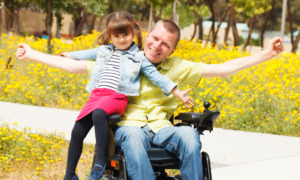Four-year-old Daniel Wilson was literally a handful.
“It was all I could do to hold him,” says his 31-year-old father, DeWayne Wilson, a brawny carpenter for the Tennessee Valley Authority. “He would have a rage attack at home and it would take all my concentration and every muscle in my body to hold him still.”
Wilson’s method: squat behind his son and engulf him in his arms.
After several such episodes, spiked by similar outbursts at school (where police had to remove him), Daniel’s mother, Lynn Gumns, embraced the inevitable: “We knew we had to do something. We were at wit’s end.”
They were put into contact with Youth Villages (YV); when youth worker Wade Bond made his first visit to the Wilson home, Daniel greeted him by overturning tables and flinging magazines.
“Daniel knows how to push buttons,” observes the boy’s father.
Bond showed Wilson and Gumns how to structure Daniel’s life by putting up signs such as, “I will flush the toilet” and “I will wash my face.” After several weeks Daniel warmed to Ward, so much so that shortly after their bonding, Ward discharged Daniel from the counseling program. Two weeks later, Daniel ran away from home with his equally bright nine-year-old brother, Eric.
‘I Resented Him’
Eric was referred to YV, which put the entire family back in the YV program. Enter youth worker/counselor No. 2, Dana Ferguson. Among the new strategies: Take Daniel for testing at a mental health facility.
“I thought I was going to Chuckie Cheese,” Daniel says.
The tests showed that the boy had attention-deficit/hyperactivity disorder (ADHD).
Ferguson counseled the parents on how to deal with an ADHD child, but it was Gumns who was with Daniel most of the time and who daily dealt with school authorities who wanted Daniel out of their sight. She bore the brunt of Daniel’s attacks. The mother refused to have her boy medicated, or sent to an institution or residential facility. But the talks with Ferguson, Gumns says, “made me understand that although I loved him with all my heart, I resented him.”
Resented him for taking up so much of her time morning, noon and night. Resented him for all the times she opened the door to find him in the arms of the police after a school truancy. This admission to Ferguson was the release Gumns needed. “I found out that it was okay to be upset. By not admitting it, I was feeding feelings of guilt that I was feeling less love for him. … I was upset by his actions, but I still loved him.”
Paging Dana
One full-blown Daniel rage occurred one evening at seven; Gumns paged Ferguson, who came right over. “I stayed until 2:30 in the morning, when the situation calmed down,” she recalls.
Ferguson also helped Gumns fight the school brass. Because of the severity of Daniel’s problems, the school system suggested that he be educated at home, through the schools’ home-bound program. Educational materials would be provided along with teacher visits.
Gumns and Ferguson disagreed. They argued that Daniel needed to be in school, where he could learn social skills and see good behavior modeled by other children. “Being schooled at home would have caused even more problems for Daniel,” Ferguson says. School officials relented.
Ferguson and Gumns used Section 504 of the Rehabilitation Act of 1973 to keep Daniel in kindergarten. They used an IDEA (Individuals with Disabilities Education Act) provision to back up their request for a teacher’s assistant to sit next to Daniel throughout the school day to give him extra supervision and attention. School officials agreed. Today the assistant sits in the back of Daniel’s first grade classroom (he’s now six) and helps him when needed.
Daniel’s 11-year-old brother, Eric, is an honor-roll fifth-grader. Sister Cissy, five, is a kindergartener and artist, and blessed with a sweet disposition.
When Ferguson was prompted to supervisor at YV, a third youth worker stepped in to help the family.
Together Again
“I’m a city girl and I never thought a quiet, normal environment would be anything I could or would want to appreciate,” confides Gumns, who like Wilson hails from Chicago. “But let me tell ya’, I’m loving it.”
The family has been discharged from the Youth Villages program. Gumns and Wilson, together for 13 years, plan to marry next month – with three YV workers invited.
The Youth Villages Research and Outcomes Department will call the family every three months for up to two years for updates. If there is an indication of some approaching difficulty, a counselor will work with them.
“After all,” says Ferguson, “kids’ behavioral problems are not scheduled around a counselor’s schedule.”































